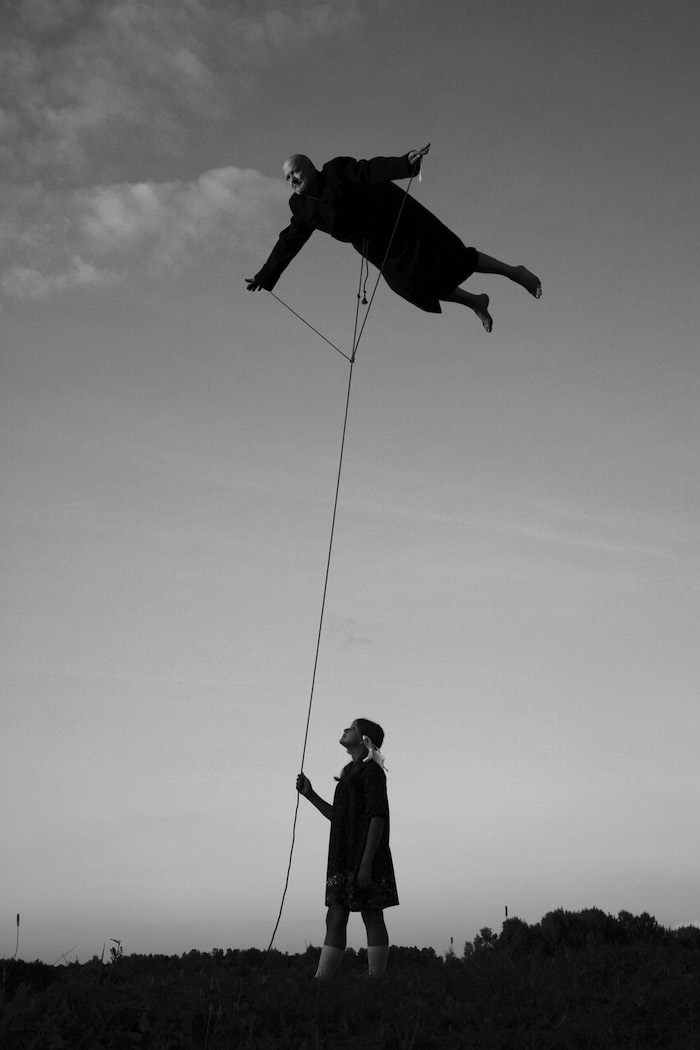Eight Ways of Looking at a Man-Kite
Nancy Chen Long
after “A Girl with a Kite” by Algis Griškevičius
 1.
Her newly-surfaced father might simply be
a quaint idea, the inkling of family
erased the day he bolted. He’s giddy to learn
she’s become an architect of bridges.
Both of them wary he’ll fly away again.
Both conscious of the tether that now anchors him
to her. Earning her trust through stories
of place—horizons unable to keep their secrets,
parables of being unbridled. He’s content
to bob in the air as she guides him with string
unfurled from a gyroscope. Later at the bistro,
she’ll speak of archways and compass, surprising
him with her tensile strength, her breadth of knowledge
—more remarkable than any place he’s ever lived.
2.
Everyone spends their days at the hotel. Her mother
tends the kitchen. Vichyssoise and salad. Butterscotch
sundaes in the service area. She’s a chance child
of science, trained in flight, the use of air as a method
of escape. No father but in her friend the concierge
who longed to be airborne. One day, in the name
of friendship and science, in the service of homework,
she cobbled together a kite—fashioned a sail
out of terrycloth scraps, bolted into place
a frame from old curtain rods, knotted hotel linens
together to form a tether. And when she sent
her friend up into the prevailing winds, he, happy
to be wearing a kite-robe of hotel hand-me-downs,
wondered why he hadn’t worn any pants.
3.
Because he fears falling. Because at 70, age
urges him to be scientific as well as sincere,
while progress urges him to be the student—
he will skip the hat and wear a kite, rising
high enough to strike the lenticular clouds,
while friends wave up to him like residents
of Oz hailing the Great and Magnificent.
Because he wants to be like his young neighbor,
wizard-kind—airborne since birth, she dares
to strike out on her own. Because, wind-guide,
she teaches, tightens every harness. Because
she loves longshots and nighttime somersaults
across zephyr winds. Because even storm-
riddled, she flies untethered, no string to strike.
4.
You can count on the air
to sustain your uncle’s heft
in the same way you can count on the copperhead
draped across your shoulders
to lick your neck at sunset. Yes, most days
are amazingly dull. Oh, it’s pleasant enough,
this girdled view from the ground.
Life must surely be more
than a reckoning. Most days, all that counts
is the breeze kicking up.
Rare is the man who doesn’t require a good bat suit
in order to stay aloft. But all that’s needed for you
to fly are patent leather shoes and your trusty
snake, if only your uncle would let you.
5.
I can soar higher than any O’Keefe, Matisse,
or Magritte. I’m the Picasso of Wednesday
hot-air balloon races, a winner, the one to back.
Happiness is not the point—I have enough
fantastic articles on flight, enough science
strung with bits of art, enough snarky answers
to make every foe back down. But first, I must suffer
my rival. Really, she’s from the Addams Family.
Why else would she call me Uncle Fester? I’m ready
for my next great feat—my easel, the high-noon sky
blazed with cayenne. Not this mocking kite-dream.
Punish this. No—publish it. My importance makes me
dangerous. Why else would my rival fly me like a kite?
Why else would she turn me into an objet d’art?
6.
He’s the type of uncle that’s wrong.
She’s the type of niece
that has shackled him onto a red kite.
As she smiles, she pulls and he dips.
She releases just a skosh and where is he?
Repentant, gnawing his nails to the quick.
In due time, a cyclone will cause her
to ground him. He’ll see she’s grown
into a hawk or a wizard.
He’ll attempt to free himself
from himself, separate the quick
from the dead. But for now, puppet uncle,
he howls and flails. And when she grins,
she scares the shit out of him.
7.
For childhood friends, happiness is an act
of courage, a trust experiment. One must be kite-
ready, compass in hand—the next adventure
just a jet stream away. She’s the one grounded
this time, antsy for her turn
to jet into the cobalt. He depends on her, guided
by wind-tufts, to navigate him safely over the ridge.
Tumbling in the clouds, he dreams of their last
escapade—cashews, beef jerky, cherries, oatmeal.
Popping in the air like popcorn, he bumps into a hawk,
grateful it wasn’t a jet, realizes he really has to pee.
What a dilemma!
Later, chess. Cheese sandwiches and gherkins,
cookies and Tang—drinking like astronauts.
8.
A Wednesday wind once floated in, carrying
a father. He stood on clouds of trees, spun
stories through the breeze, theories tied to a rope
around his waist. Afraid of tornadoes.
If you believe it, then you will be it.
And wasn’t he always so busy believing
in air? He said his family was the thing
that weighted him. Cut me more slack!
he commanded. Rope in hand, her grip loosened
as he hovered over the pale, straw-stippled prairie.
Up, up, up, he soared. She thought that day
of letting go, letting him bob to Kansas
or Kentucky, free herself to find
a solid father, not one invested in wind.
1.
Her newly-surfaced father might simply be
a quaint idea, the inkling of family
erased the day he bolted. He’s giddy to learn
she’s become an architect of bridges.
Both of them wary he’ll fly away again.
Both conscious of the tether that now anchors him
to her. Earning her trust through stories
of place—horizons unable to keep their secrets,
parables of being unbridled. He’s content
to bob in the air as she guides him with string
unfurled from a gyroscope. Later at the bistro,
she’ll speak of archways and compass, surprising
him with her tensile strength, her breadth of knowledge
—more remarkable than any place he’s ever lived.
2.
Everyone spends their days at the hotel. Her mother
tends the kitchen. Vichyssoise and salad. Butterscotch
sundaes in the service area. She’s a chance child
of science, trained in flight, the use of air as a method
of escape. No father but in her friend the concierge
who longed to be airborne. One day, in the name
of friendship and science, in the service of homework,
she cobbled together a kite—fashioned a sail
out of terrycloth scraps, bolted into place
a frame from old curtain rods, knotted hotel linens
together to form a tether. And when she sent
her friend up into the prevailing winds, he, happy
to be wearing a kite-robe of hotel hand-me-downs,
wondered why he hadn’t worn any pants.
3.
Because he fears falling. Because at 70, age
urges him to be scientific as well as sincere,
while progress urges him to be the student—
he will skip the hat and wear a kite, rising
high enough to strike the lenticular clouds,
while friends wave up to him like residents
of Oz hailing the Great and Magnificent.
Because he wants to be like his young neighbor,
wizard-kind—airborne since birth, she dares
to strike out on her own. Because, wind-guide,
she teaches, tightens every harness. Because
she loves longshots and nighttime somersaults
across zephyr winds. Because even storm-
riddled, she flies untethered, no string to strike.
4.
You can count on the air
to sustain your uncle’s heft
in the same way you can count on the copperhead
draped across your shoulders
to lick your neck at sunset. Yes, most days
are amazingly dull. Oh, it’s pleasant enough,
this girdled view from the ground.
Life must surely be more
than a reckoning. Most days, all that counts
is the breeze kicking up.
Rare is the man who doesn’t require a good bat suit
in order to stay aloft. But all that’s needed for you
to fly are patent leather shoes and your trusty
snake, if only your uncle would let you.
5.
I can soar higher than any O’Keefe, Matisse,
or Magritte. I’m the Picasso of Wednesday
hot-air balloon races, a winner, the one to back.
Happiness is not the point—I have enough
fantastic articles on flight, enough science
strung with bits of art, enough snarky answers
to make every foe back down. But first, I must suffer
my rival. Really, she’s from the Addams Family.
Why else would she call me Uncle Fester? I’m ready
for my next great feat—my easel, the high-noon sky
blazed with cayenne. Not this mocking kite-dream.
Punish this. No—publish it. My importance makes me
dangerous. Why else would my rival fly me like a kite?
Why else would she turn me into an objet d’art?
6.
He’s the type of uncle that’s wrong.
She’s the type of niece
that has shackled him onto a red kite.
As she smiles, she pulls and he dips.
She releases just a skosh and where is he?
Repentant, gnawing his nails to the quick.
In due time, a cyclone will cause her
to ground him. He’ll see she’s grown
into a hawk or a wizard.
He’ll attempt to free himself
from himself, separate the quick
from the dead. But for now, puppet uncle,
he howls and flails. And when she grins,
she scares the shit out of him.
7.
For childhood friends, happiness is an act
of courage, a trust experiment. One must be kite-
ready, compass in hand—the next adventure
just a jet stream away. She’s the one grounded
this time, antsy for her turn
to jet into the cobalt. He depends on her, guided
by wind-tufts, to navigate him safely over the ridge.
Tumbling in the clouds, he dreams of their last
escapade—cashews, beef jerky, cherries, oatmeal.
Popping in the air like popcorn, he bumps into a hawk,
grateful it wasn’t a jet, realizes he really has to pee.
What a dilemma!
Later, chess. Cheese sandwiches and gherkins,
cookies and Tang—drinking like astronauts.
8.
A Wednesday wind once floated in, carrying
a father. He stood on clouds of trees, spun
stories through the breeze, theories tied to a rope
around his waist. Afraid of tornadoes.
If you believe it, then you will be it.
And wasn’t he always so busy believing
in air? He said his family was the thing
that weighted him. Cut me more slack!
he commanded. Rope in hand, her grip loosened
as he hovered over the pale, straw-stippled prairie.
Up, up, up, he soared. She thought that day
of letting go, letting him bob to Kansas
or Kentucky, free herself to find
a solid father, not one invested in wind.
 1.
Her newly-surfaced father might simply be
a quaint idea, the inkling of family
erased the day he bolted. He’s giddy to learn
she’s become an architect of bridges.
Both of them wary he’ll fly away again.
Both conscious of the tether that now anchors him
to her. Earning her trust through stories
of place—horizons unable to keep their secrets,
parables of being unbridled. He’s content
to bob in the air as she guides him with string
unfurled from a gyroscope. Later at the bistro,
she’ll speak of archways and compass, surprising
him with her tensile strength, her breadth of knowledge
—more remarkable than any place he’s ever lived.
2.
Everyone spends their days at the hotel. Her mother
tends the kitchen. Vichyssoise and salad. Butterscotch
sundaes in the service area. She’s a chance child
of science, trained in flight, the use of air as a method
of escape. No father but in her friend the concierge
who longed to be airborne. One day, in the name
of friendship and science, in the service of homework,
she cobbled together a kite—fashioned a sail
out of terrycloth scraps, bolted into place
a frame from old curtain rods, knotted hotel linens
together to form a tether. And when she sent
her friend up into the prevailing winds, he, happy
to be wearing a kite-robe of hotel hand-me-downs,
wondered why he hadn’t worn any pants.
3.
Because he fears falling. Because at 70, age
urges him to be scientific as well as sincere,
while progress urges him to be the student—
he will skip the hat and wear a kite, rising
high enough to strike the lenticular clouds,
while friends wave up to him like residents
of Oz hailing the Great and Magnificent.
Because he wants to be like his young neighbor,
wizard-kind—airborne since birth, she dares
to strike out on her own. Because, wind-guide,
she teaches, tightens every harness. Because
she loves longshots and nighttime somersaults
across zephyr winds. Because even storm-
riddled, she flies untethered, no string to strike.
4.
You can count on the air
to sustain your uncle’s heft
in the same way you can count on the copperhead
draped across your shoulders
to lick your neck at sunset. Yes, most days
are amazingly dull. Oh, it’s pleasant enough,
this girdled view from the ground.
Life must surely be more
than a reckoning. Most days, all that counts
is the breeze kicking up.
Rare is the man who doesn’t require a good bat suit
in order to stay aloft. But all that’s needed for you
to fly are patent leather shoes and your trusty
snake, if only your uncle would let you.
5.
I can soar higher than any O’Keefe, Matisse,
or Magritte. I’m the Picasso of Wednesday
hot-air balloon races, a winner, the one to back.
Happiness is not the point—I have enough
fantastic articles on flight, enough science
strung with bits of art, enough snarky answers
to make every foe back down. But first, I must suffer
my rival. Really, she’s from the Addams Family.
Why else would she call me Uncle Fester? I’m ready
for my next great feat—my easel, the high-noon sky
blazed with cayenne. Not this mocking kite-dream.
Punish this. No—publish it. My importance makes me
dangerous. Why else would my rival fly me like a kite?
Why else would she turn me into an objet d’art?
6.
He’s the type of uncle that’s wrong.
She’s the type of niece
that has shackled him onto a red kite.
As she smiles, she pulls and he dips.
She releases just a skosh and where is he?
Repentant, gnawing his nails to the quick.
In due time, a cyclone will cause her
to ground him. He’ll see she’s grown
into a hawk or a wizard.
He’ll attempt to free himself
from himself, separate the quick
from the dead. But for now, puppet uncle,
he howls and flails. And when she grins,
she scares the shit out of him.
7.
For childhood friends, happiness is an act
of courage, a trust experiment. One must be kite-
ready, compass in hand—the next adventure
just a jet stream away. She’s the one grounded
this time, antsy for her turn
to jet into the cobalt. He depends on her, guided
by wind-tufts, to navigate him safely over the ridge.
Tumbling in the clouds, he dreams of their last
escapade—cashews, beef jerky, cherries, oatmeal.
Popping in the air like popcorn, he bumps into a hawk,
grateful it wasn’t a jet, realizes he really has to pee.
What a dilemma!
Later, chess. Cheese sandwiches and gherkins,
cookies and Tang—drinking like astronauts.
8.
A Wednesday wind once floated in, carrying
a father. He stood on clouds of trees, spun
stories through the breeze, theories tied to a rope
around his waist. Afraid of tornadoes.
If you believe it, then you will be it.
And wasn’t he always so busy believing
in air? He said his family was the thing
that weighted him. Cut me more slack!
he commanded. Rope in hand, her grip loosened
as he hovered over the pale, straw-stippled prairie.
Up, up, up, he soared. She thought that day
of letting go, letting him bob to Kansas
or Kentucky, free herself to find
a solid father, not one invested in wind.
1.
Her newly-surfaced father might simply be
a quaint idea, the inkling of family
erased the day he bolted. He’s giddy to learn
she’s become an architect of bridges.
Both of them wary he’ll fly away again.
Both conscious of the tether that now anchors him
to her. Earning her trust through stories
of place—horizons unable to keep their secrets,
parables of being unbridled. He’s content
to bob in the air as she guides him with string
unfurled from a gyroscope. Later at the bistro,
she’ll speak of archways and compass, surprising
him with her tensile strength, her breadth of knowledge
—more remarkable than any place he’s ever lived.
2.
Everyone spends their days at the hotel. Her mother
tends the kitchen. Vichyssoise and salad. Butterscotch
sundaes in the service area. She’s a chance child
of science, trained in flight, the use of air as a method
of escape. No father but in her friend the concierge
who longed to be airborne. One day, in the name
of friendship and science, in the service of homework,
she cobbled together a kite—fashioned a sail
out of terrycloth scraps, bolted into place
a frame from old curtain rods, knotted hotel linens
together to form a tether. And when she sent
her friend up into the prevailing winds, he, happy
to be wearing a kite-robe of hotel hand-me-downs,
wondered why he hadn’t worn any pants.
3.
Because he fears falling. Because at 70, age
urges him to be scientific as well as sincere,
while progress urges him to be the student—
he will skip the hat and wear a kite, rising
high enough to strike the lenticular clouds,
while friends wave up to him like residents
of Oz hailing the Great and Magnificent.
Because he wants to be like his young neighbor,
wizard-kind—airborne since birth, she dares
to strike out on her own. Because, wind-guide,
she teaches, tightens every harness. Because
she loves longshots and nighttime somersaults
across zephyr winds. Because even storm-
riddled, she flies untethered, no string to strike.
4.
You can count on the air
to sustain your uncle’s heft
in the same way you can count on the copperhead
draped across your shoulders
to lick your neck at sunset. Yes, most days
are amazingly dull. Oh, it’s pleasant enough,
this girdled view from the ground.
Life must surely be more
than a reckoning. Most days, all that counts
is the breeze kicking up.
Rare is the man who doesn’t require a good bat suit
in order to stay aloft. But all that’s needed for you
to fly are patent leather shoes and your trusty
snake, if only your uncle would let you.
5.
I can soar higher than any O’Keefe, Matisse,
or Magritte. I’m the Picasso of Wednesday
hot-air balloon races, a winner, the one to back.
Happiness is not the point—I have enough
fantastic articles on flight, enough science
strung with bits of art, enough snarky answers
to make every foe back down. But first, I must suffer
my rival. Really, she’s from the Addams Family.
Why else would she call me Uncle Fester? I’m ready
for my next great feat—my easel, the high-noon sky
blazed with cayenne. Not this mocking kite-dream.
Punish this. No—publish it. My importance makes me
dangerous. Why else would my rival fly me like a kite?
Why else would she turn me into an objet d’art?
6.
He’s the type of uncle that’s wrong.
She’s the type of niece
that has shackled him onto a red kite.
As she smiles, she pulls and he dips.
She releases just a skosh and where is he?
Repentant, gnawing his nails to the quick.
In due time, a cyclone will cause her
to ground him. He’ll see she’s grown
into a hawk or a wizard.
He’ll attempt to free himself
from himself, separate the quick
from the dead. But for now, puppet uncle,
he howls and flails. And when she grins,
she scares the shit out of him.
7.
For childhood friends, happiness is an act
of courage, a trust experiment. One must be kite-
ready, compass in hand—the next adventure
just a jet stream away. She’s the one grounded
this time, antsy for her turn
to jet into the cobalt. He depends on her, guided
by wind-tufts, to navigate him safely over the ridge.
Tumbling in the clouds, he dreams of their last
escapade—cashews, beef jerky, cherries, oatmeal.
Popping in the air like popcorn, he bumps into a hawk,
grateful it wasn’t a jet, realizes he really has to pee.
What a dilemma!
Later, chess. Cheese sandwiches and gherkins,
cookies and Tang—drinking like astronauts.
8.
A Wednesday wind once floated in, carrying
a father. He stood on clouds of trees, spun
stories through the breeze, theories tied to a rope
around his waist. Afraid of tornadoes.
If you believe it, then you will be it.
And wasn’t he always so busy believing
in air? He said his family was the thing
that weighted him. Cut me more slack!
he commanded. Rope in hand, her grip loosened
as he hovered over the pale, straw-stippled prairie.
Up, up, up, he soared. She thought that day
of letting go, letting him bob to Kansas
or Kentucky, free herself to find
a solid father, not one invested in wind.





